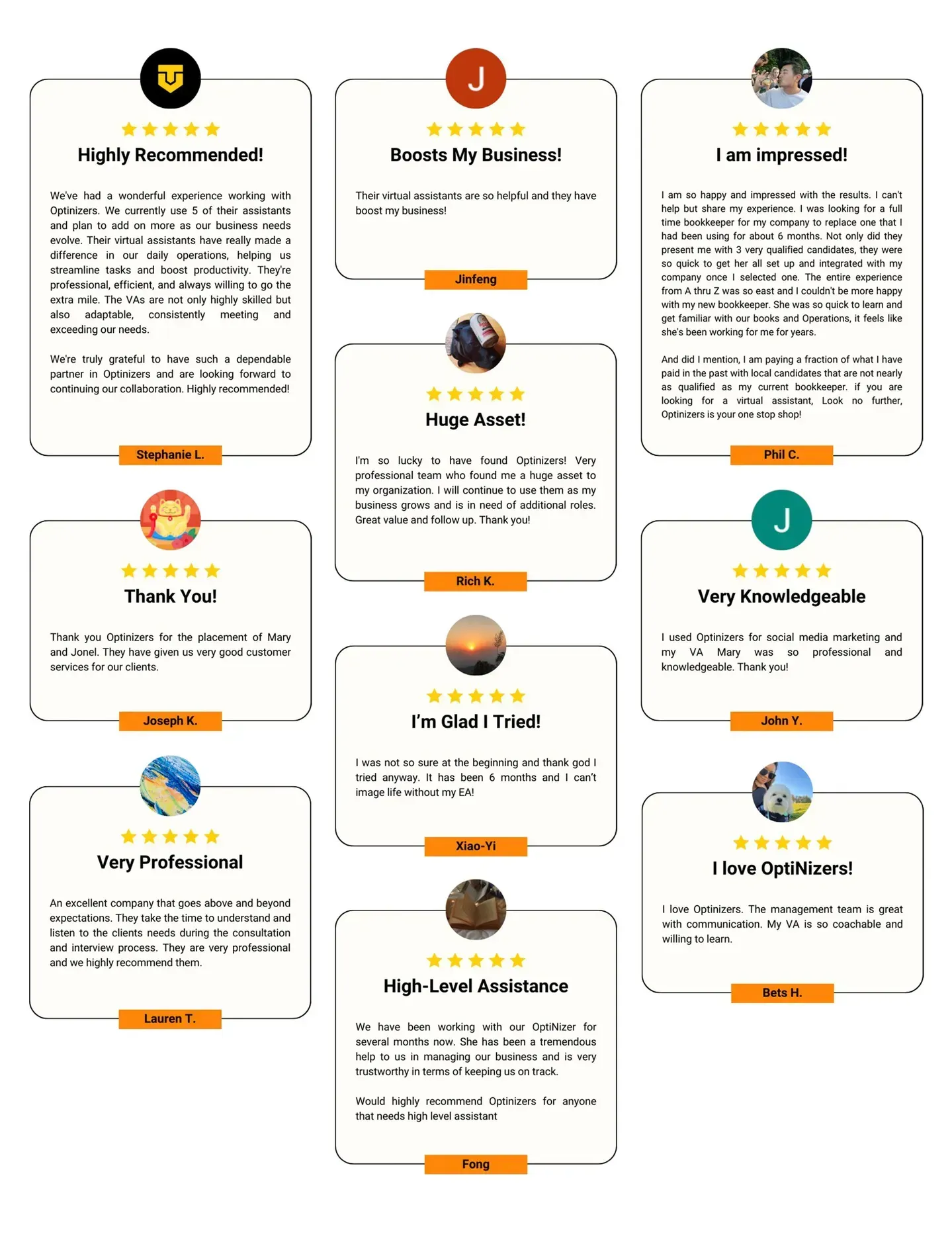OPTImize and orgaNIZE Your Life
Empower Your Business With Highly-Skilled Remote Talent
We’re not just connecting you with professionals. We’re streamlining your business
with handpicked talents, smart systems, and a human-first approach.
Top-Notch Support
We connect businesses with highly skilled Filipino remote talent, offering seamless support so you can focus on what matters most.
Proven Track Record
Our professionals are carefully selected for their expertise and experience, ensuring reliable assistance in every task.
Simplified Onboarding
We handle all paperwork, provide training resources, and offer ongoing support, making it easier for you.
Gain Back Your Time. Streamline Operations.
Focus on Growth.

At OptiNizers, we don’t just provide highly-skilled Filipino remote talent, we deliver human-first partnerships that fuel your growth.
We believe the best support starts with people who genuinely care. That’s why we go beyond skill-matching. We take time to understand your business goals, needs, and company culture, then match you with dedicated remote professionals who align with your mission and values.
Whether you need dependable paralegal support, proactive executive assistance, engaging social media managers, or client success experts who treat your clients like their own, OptiNizers brings you more than just help. We bring heart, integrity, and a commitment to excellence.
Save Up to $37,000
Per Remote Hire Every Year
Why pay for office space, equipment, and overhead when you can build a high-performing remote team that delivers results — without the extra cost?
Hire an Executive Remote Talent
Book a CallSkilled, reliable, and proactive support to help you manage priorities, streamline your day, and focus on growth
Hire a Remote Paralegal
Book a CallExperienced, detail-oriented legal support tailored to your workflow, from case prep to client communication, so your firm runs smoother, even from miles away.
Hire a Customer Support
Book a CallEfficient and solutions-focused support that feels in-house. Give your clients the experience they deserve
Hire a Social Media Specialist
Book a CallStrategic, creative, and on-brand content execution, handled by someone who understands your voice and your audience.
Hire a Digital Media Specialist
Book a CallFrom content creation to campaign execution, get data-driven digital support that helps your brand show up, stand out, and convert.
Hire a Multimedia Specialist
Book a CallVersatile, creative talent who can design, animate, edit, and bring your brand to life across platforms, all while staying on-message and on-brand.
Hire an SEO Specialist
Book a CallOptimize your online presence with data-driven strategies that boost visibility, traffic, and long-term growth. No fluff, just real results.

Ready to Scale Your Business with Highly-Skilled Filipino Remote Talent?
Find the Right Support
for Your Business
We don’t just match you with remote talent, we integrate real partners into your workflow.
We understand that every business is unique. That’s why we take a personalized approach to remote staffing; connecting you with remote professionals who are not only highly skilled but also aligned with your company’s values and goals.
With our seamless onboarding process, your OptiNizers remote talent is trained, equipped, and ready to contribute from day one. Because when the right people are in the right roles, you get your time back to focus on what truly moves the needle.

Rated Excellent by Our Clients
and Remote Talents

Honored to Be Part
of These Esteemed Organizations

Our Trusted Partner
Ready to Scale Your Business with Highly-Skilled Filipino Remote Talent?
I Know I Need Help…
I Just Don’t Know What to Hand Off.
We hear that all the time. That’s why we created the
OptiNizers Productivity Audit — your first step toward clarity, confidence, and delegation that actually works.
Download our free productivity audit to identify which tasks are slowing you down, so you can delegate smarter, lead with intention, and reclaim your time.

Listen to our Podcast
Resources






